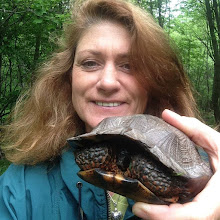In Rachel's own words:
I can
remember no time, even in earliest childhood, when I didn't assume I was
going to be a writer. Also, I can remember no time when I wasn't
interested in the out-of-doors and the whole world of nature.

We still think in
terms of conquest. We still haven't become mature enough to think of
ourselves as only a tiny part of a vast and incredible universe.
But man is a part of nature and his war against nature is inevitably a war against himself.
Now, I truly believe
that we must come to terms with nature, and I think we are challenged as
mankind has never been challenged before to prove our maturity and our
mastery, not of nature, but of ourselves.
The
more clearly we can focus our attention on the wonders and realities of
the universe about us, the less taste we shall have for destruction.

After Silent Spring's impact, and just before her death at 56 from breast cancer, she wrote to a friend,
The beauty of the living world I was trying to save has always been uppermost in my mind . That, and anger at the senseless, brutish things that were being done.
I have felt bound by a solemn obligation to do what I could. If I didn't at least try I could never be happy again in nature. But now I can believe that I have at least helped a little. It would be unrealistic to believe one book could bring a complete change."It is a wholesome and necessary thing for us to turn again to the earth and in the contemplation of her beauties to know the sense of wonder and humility.
In a television
interview, Carson stated that "man's endeavors to control nature by his
powers to alter and to destroy would inevitably evolve into a war
against himself, a war he would lose unless he came to terms with
nature."
| Wild creatures, like men, must have a place to live. As civilization creates cities, builds highways, and drains marshes, it takes away, little by little, the land that is suitable for wildlife. And as their space for living dwindles, the wildlife populations themselves decline. Wildlife refuges resist this trend by saving some areas from encroachment, and by preserving in them, or restoring where necessary, the conditions that wild things need in order to live. |
|---|


.jpg)




No comments:
Post a Comment